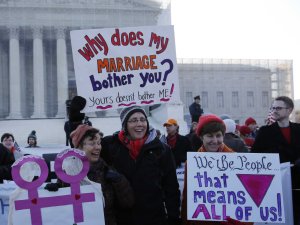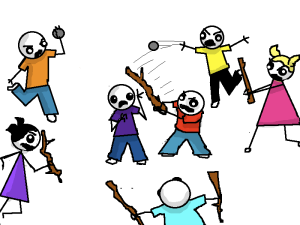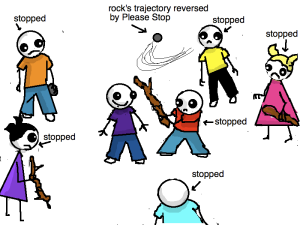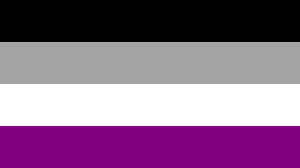This past Tuesday the Supreme Court began hearings on the constitutionality of states outlawing marriage between two individuals of the same gender. The internet world is abuzz as to whether the constitution protects same-sex marriages and whether states must recognize those marriages.


Regardless of your theology concerning politics, regardless of whether you support or discourage the legalization of same-sex marriages, regardless of whether you share articles on Facebook or you march in D.C., I have a question for you:
Is marriage really the most important justice issue with regard LGBTQ people?
I know a Savoir who says, “Come to me, all who labor and are heavy laden, and I will give you rest. Take my yoke upon you, and learn from me, for I am gentle and lowly in heart, and you will find rest for your souls. For my yoke is easy, and my burden is light.” (Matthew 11:28-30). I know a God who says, “I desire mercy, and not sacrifice, / the knowledge of God rather than burnt offerings.” (Hosea 6:6) and asks, “what does the Lord require of you / but to do justice, and to love kindness, and to walk humbly with your God?” (Micah 6:8).
The Law of God is to “love the Lord your God with all your heart and with all your soul and with all your mind. This is the first and greatest commandment. And a second is like it: You shall love your neighbor as yourself. On these two commandments depend all the Law and the Prophets.” (Matthew 22:37-39) and when asked who a neighbor is Jesus told a parable of two men who were societal enemies and of a deep love, care, and sacrifice that saved one man’s life (Luke 10:25-37).
I know a God who made provision for widows and orphans and eunuchs and foreigners, all some of the most outcast, ignored, and repressed people of Jewish culture. But God cared for them, even when humanity didn’t. The people of God are told to do justice and care for the widows and the orphans (James 1:27). God welcomes the foreigners (Isaiah 56:1-8) into God’s shelter and grace and provides ways to access God and to live among the people of Israel. God welcomes in the eunuchs and gives them a special promise that they wwill not be cut off (Isaiah 56: 1-8).
I want to be very clear here. I am NOT advocating for a gospel of social justice. What determines salvation is the grace of God by faith, not by works (Romans 3:19 -25). Yet we serve a God who cares deeply about social justice. Jesus spent his time with and worked miracles for the most ignored people of the time – widows, lepers, roman centurions, tax collectors, prostitutes, the blind, the lame, the demon possessed, even the man who would betray him. Jesus went to the fringes and there he loved and healed.
If we are called to love like Christ, and we are (John 13:31-35), then we should be going to the fringes and loving those we find. One fringe group in our culture is LGBTQ people, especially youth. Statistically about one in ten people are LGB – whether they identify as gay, lesbian, bisexual, same-sex attracted, struggling with SSA, or some other term – you likely know someone already. When it comes to trans*gender populations the statistics are more uncertain, some say one in 1,000 others say one in 100,000. But trans* people exist and you may know someone.

For LGBTQ youth the rates of abuse, homelessness, bullying, depression, and suicide are all higher than the average teen (Check out some stats here and here). What these hurting individuals need is not a debate about the biblical and political definitions of marriage and whether or not they should align. NO.
NO! They need safe, non-violent, loving adults in their lives. They need homes where they will not be abused or thrown out. They need counseling to cope with the condemnation and aggression they face, to help them heal, to see themselves positively and with value. They need people speaking hope into their lives. They need teachers and administrators and clergy who will not stand for bullying in their schools and communities and churches. They need to hear that they are valuable human beings created in the image of God, they are dearly loved, and the gospel of grace applies to them.
The enemy has many ploys to distract us from the heart and work of God. Perhaps one of those is to misdirect our efforts into ventures that may be of little consequence. Are our efforts, either to further or to end same-sex marriage legalization, bringing life and hope to those who need it most? There are LGBTQ youth in need right now. Are we really loving mercy and acting justly?





















